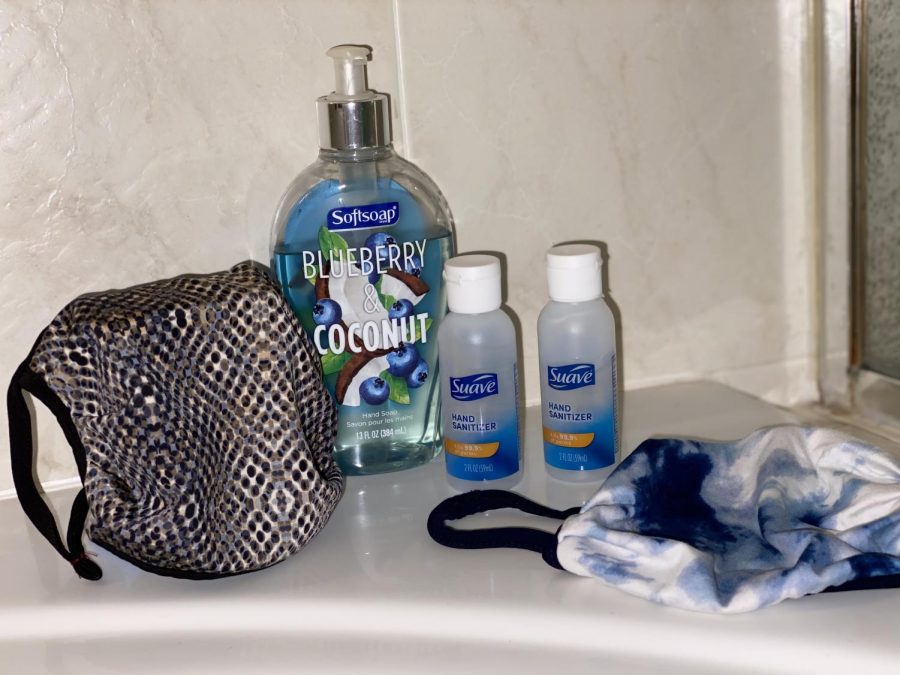ENVIRONMENTAL CRISIS DURING THE CORONAVIRUS
Due to Covid-19, large amounts of plastic from gloves and one time use masks are being disposed of and adding to the increase in pollution. Small ways you can help reduce the amount of plastic discarded is by using cotton masks that rather than throwing away, you wash and are able to wear them as many times as you need. Another way is by just using hand sanitizer after out in a public place rather than plastic gloves.
October 1, 2020
As the entire world may know it, we are currently experiencing a global pandemic with a new disease, the coronavirus. In order to prevent further contact or spread with the disease, we all have been taking precautions to protect ourselves from COVID-19. This includes but is not limited to wearing masks and gloves as well as sanitizing before and after the use of a product outside (shopping cart or a gas pump). In hindsight, this solution may seem correct, but there is a negative side effect. In consequence to increased usage of gloves, masks, and other sanitary products, an increased amount of littering is occurring. A number of masks, gloves, and sanitizing wipes have been either tossed aside on the road or have just not been properly disposed of. This could become a big issue as the virus may be spread around a lot quicker if we continued to litter.
It is said that with each month of the coronavirus pandemic, 129 billion face masks and 65 billion plastic gloves are being disposed of. Furthermore, a majority of these products end up in places that could be detrimental to our environment.
“At the current rate, we’re putting a 129 billion — I’m saying a billion — face masks into the environment every single month. [And] 65 billion plastic gloves into the environment every single month. A significant portion of those would be disposed of improperly and wind up in the ocean.” said Doug Cress, Vice President of Conservation for ocean protection organization Ocean Conservancy.
With each mask and glove that is incorrectly disposed of, there is always a chance of it being carried away by wind or rain and landing in our oceans, harming our marine environment. In fact, single-use surgical masks, N95 masks, and gloves are all made from synthetic, non-biodegradable materials, meaning they take hundreds of years to break down in the environment. That being said, the longer a product breaks down in the ocean for example, increases the likelihood of harming an animal who confuses the item with food.
“The glove or the mask that you take off and casually disregard because you think it was safe for that day, could easily be the glove or the mask that kills a whale,” added Cress
“At the current rate, we’re putting a 129 billion — I’m saying billion — face masks into the environment every single month. [And] 65 billion plastic gloves into the environment every single month. A significant portion of those would be disposed of improperly and wind up in the ocean.”
Many people fail to see that plastic waste in the ocean was already a huge problem that had started way before the pandemic. So it’s important to highlight what steps need to be taken in order to both protect ourselves and the environment that we live in.
The Centers for Disease Control (CDC) and the World Health Organization (WHO) both have stated that wearing gloves in public situations is completely unnecessary and could cause cross-contamination. Instead, using hand sanitizer to properly disinfect your hands in a public space, avoiding contact with the eyes, nose, and mouth, and washing your hands when you arrive home would be safer ways of protecting yourself from the virus.
The WHO also recommends purchasing a cloth mask that is reusable and washable in order to reduce the use of surgical masks and risk of possible disposal of them into the environment.. Although, in the chance you do wear a surgical mask, make sure to properly dispose of them by throwing them in a bag and knotting the top. That way, the wind or rain would possibly not spread around the plastic and put it in the ocean.
Taking extra precautions to protect yourself from the virus is extremely important. However, it is just as important to keep in mind that COVID-19 isn’t the only detrimental situation that is currently happening.
Have a better way to conserve the environment during the coronavirus? Comment down below or on instagram @seminolenewspaper !!



















